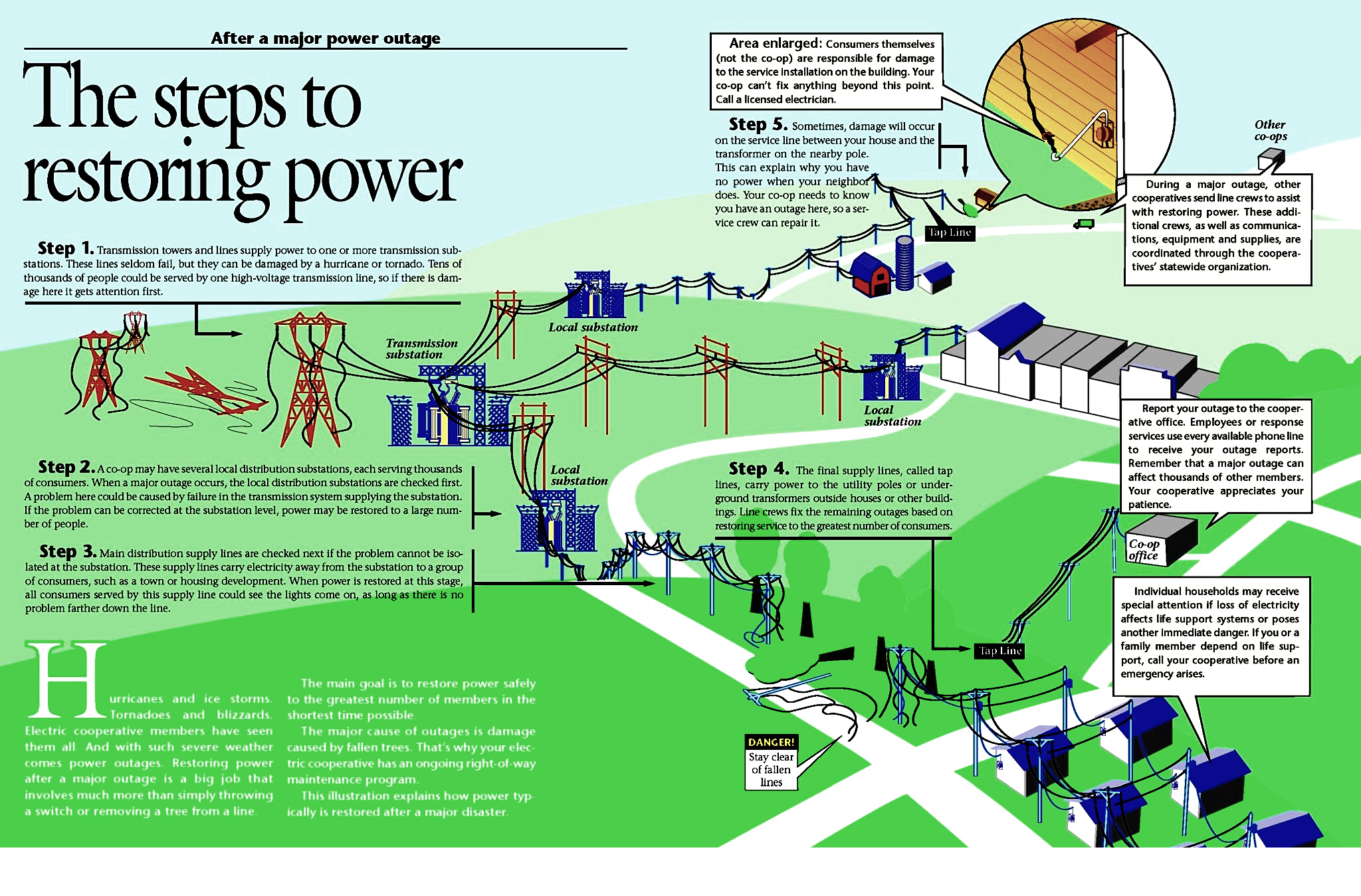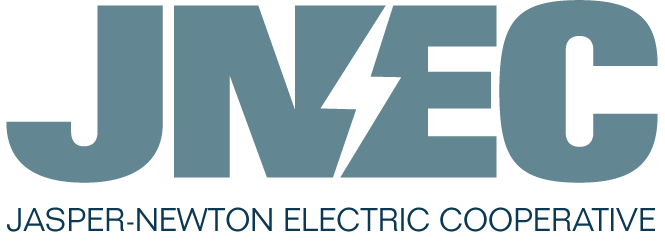
JNEC’s procedure for restoring power?
Restoring power after widespread outages is a big job that involves more than simply throwing a switch or removing a tree from a line. The main goal is to safely restore power to the most significant number of members in the shortest time possible. The process begins with a damage assessment of the co-op’s lines and facilities by employees trained to accomplish those tasks. The assessment allows JNEC to direct its resources (labor and materials) to the most needed areas. Any damage to power plants, substations, or transmission lines that affects JNEC's service area needs repair before your electric service is restored. When those facilities work, problems in your co-op’s electric distribution system can be corrected.
Transmission Lines
Transmission lines seldom fail, but storms can damage them. A single high-voltage transmission line can serve tens of thousands of people.
Substations
When a major outage occurs, local distribution substations are inspected. If the problem can be corrected at the substation level, power may be restored to a large number of people.
Distribution Lines
Main distribution supply lines are inspected next to identify potential problems. These supply lines carry electricity away from the substation to a group of members, such as a subdivision.
Individual Services
The final supply lines, called service lines, carry power from the transformer on utility poles or underground transformers outside houses or other buildings. Line crews restore the remaining outages by restoring service to the most significant number of members. Sometimes, damages will occur to the service line between your house and the transformer on the nearby pole—this is an example of why you may be without power when your neighbor does have power.
If you have further questions, click on the section below for possible answers or call JNEC at 800-231-9340 or 409-423-2241.
Restoration Questions
JNEC suggests creating an outage preparation kit with items such as a portable radio, batteries, corded phone, cash, bottled water, and a flashlight. Store this kit in a designated place, so it is easy to find. Visit our Outage and Storm Checklist on our Outage Center page here for more information.
Our dispatch center monitors our electric distribution system 24/7, and during a storm, we monitor for damage to distribution circuits, power lines, and substations. However, to ensure we are also aware of your outage, please report it by contacting JNEC at 800-231-9340 or 409-423-2241. Please do not assume that others have reported the outage.
Please visit our Outage Center here for the steps you can take to help us determine if the service problem exists within your home’s electrical system or on our system.
During widespread outages, JNEC’s automated system takes members’ calls at 800-231-9340 or 409-423-2241 and routes outage information to dispatchers faster than a manual call system, helping us restore your power more efficiently. To report outages using this automated system, you’ll need your account number, meter number, or the phone number currently associated with your account. Members must use the account information associated with the power outage when reporting. Please make sure your current phone number is on file with us.
JNEC needs your up-to-date telephone number associated with your Cooperative account. We encourage members to use 800-231-9340 or 409-423-2241 whenever they have an outage, especially during widespread outages. The automated system can receive multiple calls at the same time. Your correct phone number will allow JNEC to dispatch crews as quickly as possible. It can also be helpful to have the meter number of the service without power.
If you have multiple accounts, the meter number will help JNEC identify the outage more quickly.
You should always call JNEC when you experience an outage. Especially important if you see lines or poles down, sparking, or potential hazards preventing you from leaving your property or blocking any roadways. Call JNEC’s outage-reporting system at 800-231-9340 or 409-423-2241.
After you’ve reported an outage to JNEC at 800-231-9340 or 409-423-2241, you should:
-
Turn off all electrical appliances if you experience an interruption in service, leaving a lamp on so you’ll know when power is restored.
-
Turn off the circuit breakers to major appliances. To help preserve food items, leave the doors to your refrigerator and freezer closed.
-
Once power is restored, avoid overloading by turning appliances back on in 15-minute intervals.
Restoring power to homes and businesses is a top priority for Jasper-Newton Electric Cooperative. Still, the safety of our members and employees always comes first – and it’s more important than ever to be cautious during extreme weather conditions. High winds can be hazardous for workers in bucket trucks or attempting to climb poles. Once a storm passes and wind speeds decrease, we will safely begin diligently working on outages and bringing you power as quickly as possible. The outage restoration process requires crews to troubleshoot the power lines and equipment to determine the cause and extent of the power outage. It is common for crews to drive through areas affected by the outage.
There could be several reasons a home is without power while others have it. JNEC encourages members to inspect for tripped breakers. Tripped breakers can cause your home to be without power. Another potential reason for your home to be without power is if your outage is isolated to your electric service. In some cases, the primary power line serving your home may be de-energized, while others with power may receive electric service from another primary power line.
JNEC recommends individuals using a generator should follow the manufacturer’s recommended guidelines. If you have any doubts, consult a qualified electrician.
